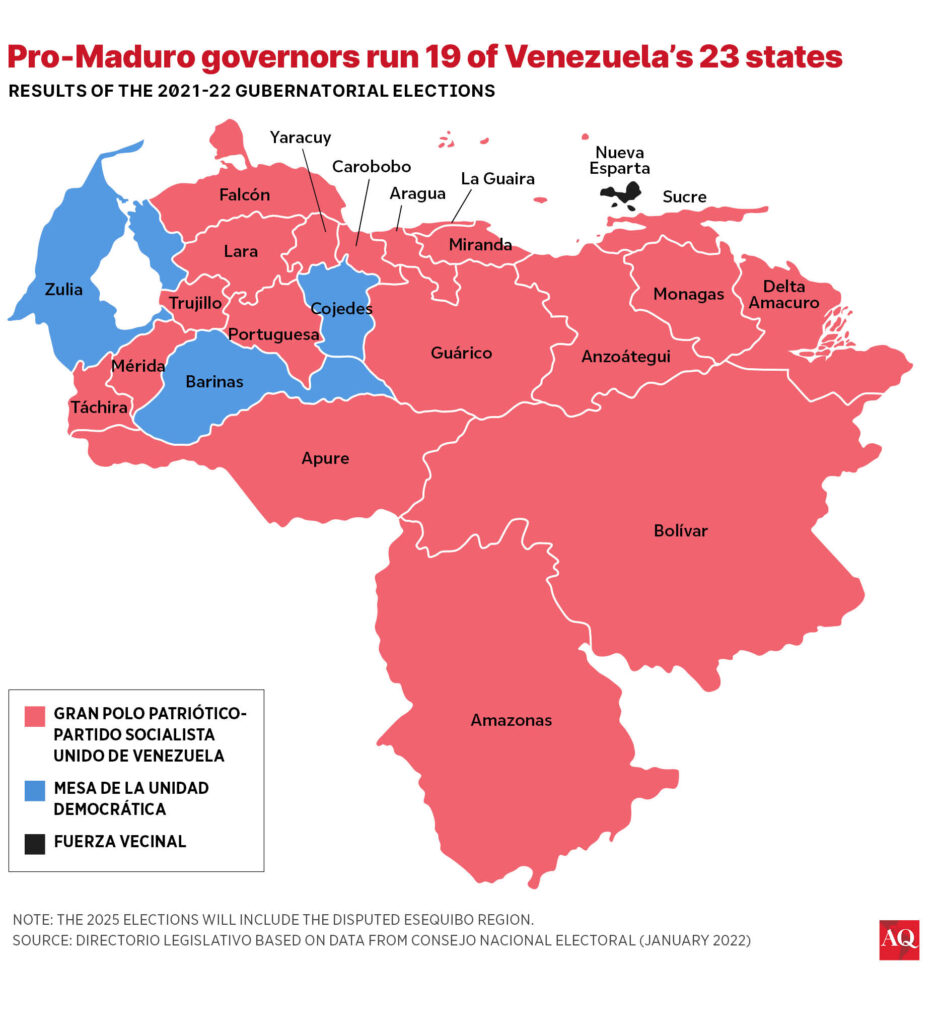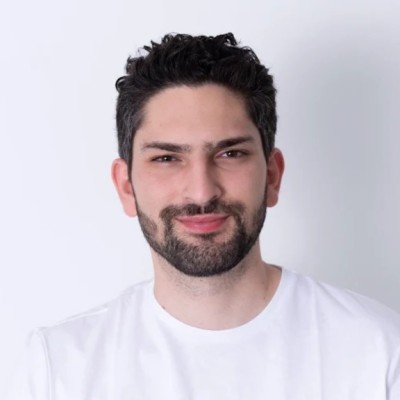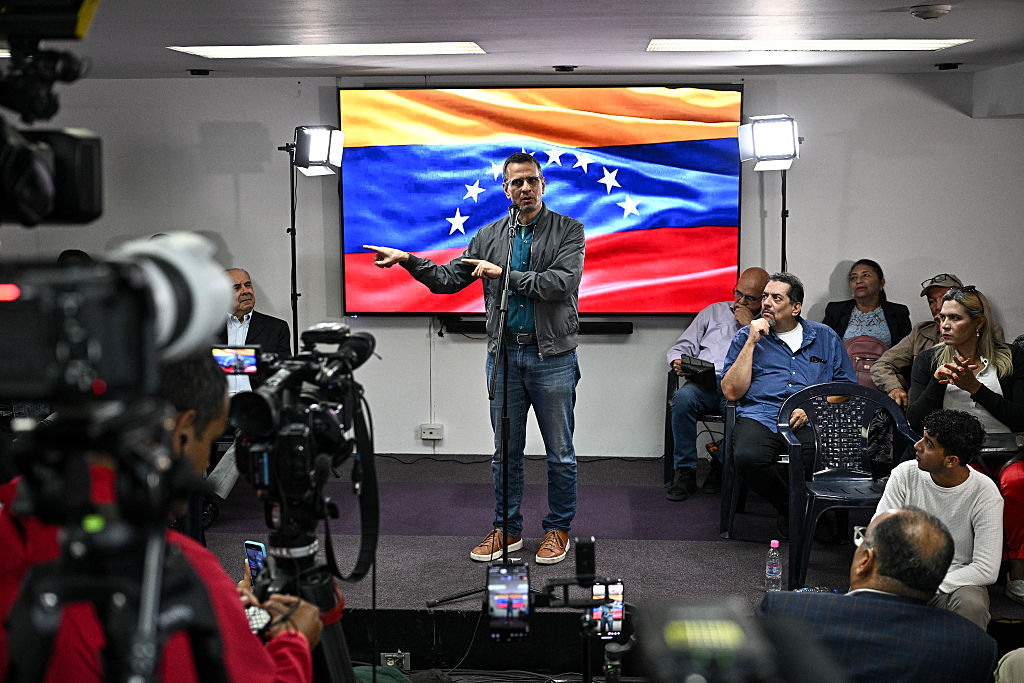CARACAS — In fewer than 45 days, Venezuela is set to undergo a new political test: the controversial regional and legislative elections that could further solidify Nicolás Maduro’s regime. However, on the streets, there are no campaign posters or rallies; the National Electoral Council has yet to follow the necessary legal procedures before an election, and its website has been down since last July, highlighting the opacity and disarray surrounding the process. The only excitement comes from the endless bickering within a fractured opposition unable to present a clear path forward.
The sense of paralysis became even more evident in early March when Omar Barboza stepped down as executive secretary of the opposition’s Democratic Unitary Platform (PUD). His almost four-year tenure included overseeing the opposition primaries in 2023 and the disputed elections last July 28, when Edmundo González Urrutia defeated Maduro, but the latter falsified results to stay in power. However, it wasn’t government repression that led to Barboza’s departure. In his resignation letter, he cited the coalition’s lack of “unity” and “leaks” undermining any honest discussion as the final straw.
Despite maintaining remarkable unity during last year’s presidential campaign, Venezuela’s diverse multi-party opposition has recently spiraled into an all-out internecine war after María Corina Machado, the most prominent political leader facing Maduro’s regime, and González ruled out participating in this year’s government-organized elections due to a lack of political and electoral guarantees. “Going to vote again and again without respecting the results is not defending the vote, it is distorting the popular vote,” Machado said in January.
The PUD has followed suit. As preconditions for participating in the elections, the coalition called for new electoral authorities, political and electoral guarantees, the return of exiles, and the liberation of political prisoners. Most major opposition leaders—as well as hundreds of activists—have been imprisoned or forced into exile, or hunkered down in recent months, including Machado, who is hiding in Caracas, and González, who lives in exile in Spain.
“The country does not want to vote and has clearly stated its reasons,” Paola Bautista de Alemán, a political scientist and one of the vice presidents of the major opposition party Primero Justicia, told AQ. The reasons are abundantly clear: the July 28 presidential election showcased the government’s ability to fabricate results, opposition parties remain banned, and many witnesses at polling stations—responsible for collecting tallies that could expose electoral fraud— were arrested or intimidated afterward.
The May 25 elections will put 285 legislative posts up for grabs, including seats for the disputed Essequibo region, which Venezuela claims from Guyana. Currently, nearly 70% of the National Assembly is controlled by the ruling party, with the remaining seats held by factions that label themselves as opposition but rarely dissent—turning the body into a rubber stamp for Maduro. The mainstream opposition boycotted the last parliamentary elections in 2020, after a Chavista-stacked judiciary stripped the Assembly of its powers following the opposition’s landslide win in 2015. Voters will also ostensibly elect 24 governors. Four states are governed by nominal opposition figures, and three of those were –until recently– aligned with the Unitary Platform.

Fragmented opposition
Maduro’s decision to bring forward the elections, which are usually held later in the year, appears to be a calculated move aimed at reshuffling the political deck before pressure mounts further—both domestically and internationally. With the U.S. revoking the oil licenses of companies like Chevron, threatening tariffs on other buyers of Venezuelan oil, and a fractured opposition still reeling from repression and exile, the regime is tightening the timeline to disorient adversaries and reward collaborators. By accelerating the vote, Maduro is cornering critics like the Democratic Unitary Platform while offering a lifeline to nominally opposition figures willing to operate within his rules, deepening the divide in a fragile coalition.
While Machado’s party and most of the PUD’s members—ten parties, including the country’s four largest non-Chavista groups—have supported Machado and González’s position, others have openly criticized the decision and announced their intention to participate. Among them are Un Nuevo Tiempo (UNT), led by Manuel Rosales, governor of the populous Zulia state, and the minor leftist party Movimiento Por Venezuela (MPV). The Unitary Platform has not ruled out expelling the two dissenting parties.
A party under stress
The case of former presidential candidate Henrique Capriles reflects the inner battles and strife in the opposition ranks. On Monday, his party Primero Justicia (PJ) expelled the politician and five other members for “betraying” the anti-Chavista unity decision to not participate in the regional elections. Earlier this month, Capriles and Henri Falcón, another former presidential candidate in the 2018 contest, launched a political platform called Citizens’ Network for the Defense of Democracy (DECIDE), encouraging followers to take part in the May 25 race. “Democrats have no better option than to use their vote,” Capriles said on April 7.
Amid Primero Justicia’s infighting, a flurry of press statements and counter-communiqués were issued—some attacking the legitimacy of party president María Beatriz Martínez, others denouncing the Caprilistas as “normalizers” or for sabotaging the party’s internal processes.
“I have serious doubts about whether the policy of abstention can be useful at this moment because it’s exactly what Maduro wants: for us not to vote, because then he’ll impose, at no cost, a National Assembly and governors tailored to his needs,” Jose Guerra, an economist close to Capriles and a former lawmaker from Primero Justicia, told AQ.
Oil and politics
Complicating the political scenario is an economy set to plunge into recession. The revocation of Chevron’s license, which accounted for approximately 230,000 barrels per day, will have a severe short-term macroeconomic impact, according to Ecoanalítica, a consulting firm. Terminating other companies’ licenses is also expected to affect a further production of 70,000 barrels per day.
Oil output under these licenses represents “30% of total output and 40% of the foreign currency flow received by the Venezuelan state,” according to Asdrúbal Oliveros, director of the research firm. Oliveros noted that this will likely lead to devaluation and the resurgence of triple-digit inflation, projected at 130-150% for this year. The firm also estimates an economic contraction of 2-3% in 2025 compared to a forecast of 3% growth at the beginning of the year. “We are also seeing a deterioration of internal economic conditions, which could exacerbate social tensions,” Oliveros told AQ.
But while Venezuela’s profound crisis precedes U.S. sanctions, and the economy has shown worsening signs since the July elections, many experts are afraid the return of the “maximum pressure” strategy will also affect everyday Venezuelans, without achieving regime change. The effectiveness of sanctions “has been drastically diminishing over the past two decades or so, especially if the explicitly stated objective of the issuing states is to try to stimulate democratization,” Venezuelan political scientist John Magdaleno told AQ. “There is no doubt that the regime is now facing a systemic difficulty that never existed before. I strongly disagree with those who point out that participating in the election was useless and, therefore, will be useless going forward.”
But in the country’s hodgepodge opposition, views differ. “We have participated in elections with few conditions before, but this time there are practically no conditions,” Roberto Enríquez, the Unitary Platform’s new executive secretary and the leader of COPEI, a small opposition party, told AQ. “Most of our candidates are either imprisoned, exiled, under [political] asylum or hiding. The government has denied us the Unity card [on the ballot]. The referee is the same as July 28,” he added.






